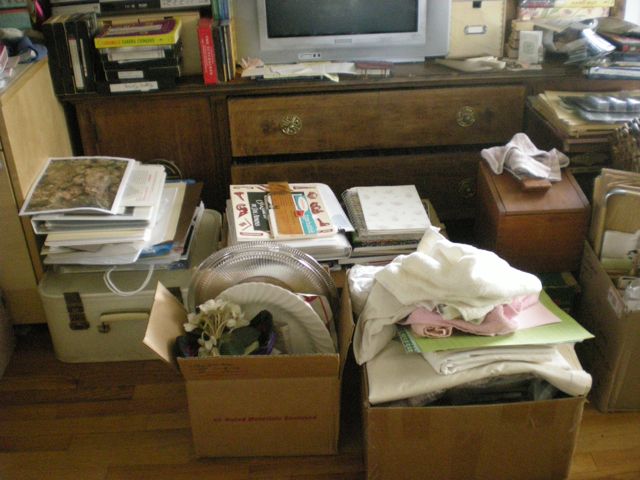Giving Away Your "Declutter" to People Who Want It
by Dale S. Brown | May 28, 2012

Part of the new American Dream is a world where we have what we need—but we also don’t have the clutter that we don’t need. This blog, and two subsequent ones, will guide you on thoughtfully giving your unwanted things to people who need them.
How I got started
I began giving away my unwanted objects when I started the financial integrity program recommended in Your Money or Your Life, by Vicki Robin and Jo Dominguez. Giving away my stuff was hard. But it helped to know that the material objects went to people who would use them.
I would love to tell you about my discipline after my decluttering project—how I maintained my beautiful home. Unfortunately, the stuff piled up again and I am now in a new round of decluttering. My experience might encourage you to thoughtfully give things away that you don’t need—even though it’s easier to just throw things in the trash!
A few suggestions
Be kind to yourself as you decide what to give away.
Be kind to yourself as you accept the need to give away things that connect you to your past. It can be emotional. For example, I hung on to a large metal fan for several years. It took up half a shelf in my closet. It belonged to my Grandmother Helen Gilman, who has passed away. Glancing at the fan would remind me of sitting with her at the kitchen table, hearing the swish of its blades and feeling the waft of its breeze.
Robert Harper, who takes care of my computer, mentioned that he works for a charity that gives furniture to people in need. He volunteered to transport my fan there. I agreed and took a picture of the fan for my memories.
As he drove off, I wanted to run after the car and shout, “I want my fan back!” I wish I could film that imagined scene to use it as a comic illustration of how it feels to give up your stuff.
Now I have space in my closet. Maybe the fan is creating memories for another child.
Giving things to friends, family, and community members
Giving things to people you know requires tact. The desire to get rid of something must be overcome with a desire to be helpful.
What works for me is telling people what I have without putting the person on the spot. Make it easy and gracious for them to refuse. Here are some examples;
- I have some beautiful soap in a bowl that I got from X store. I loved it once, but now it doesn’t seem to fit with my decor. It’s beautiful—the same as it always was. It needs a new home.
- Do you know anyone who could use a fax machine that works? I just bought a 3-in-1 printer and would love to find a person who could use my perfectly good fax.
Unless people show an immediate interest, change the subject.
Another good practice is letting people know your needs without asking for items. Your friends may have things that they want to get rid of and would be thrilled to give them to you. And once the conversation is started, they may tell you their needs, allowing you to give or lend your stuff.
Small-scale ways of sharing
Many simple projects can be done through your community groups.
For example, a friend of mine recently told me about “Recirculation Sunday,” which happens from time to time at her church. Everyone brings things that they are not using and puts them on a table. Then other people can take what they want.
“The idea,” she explained, “is that everything has spiritual energy. You take things you are not using that are energy drags. Then someone gets it and they get energy from it.”
Some communities have places where people give and take items. An apartment near me has a ledge where people leave stuff—and it always disappears.
I once went to an environmental meeting and brought things that needed to recirculate. I announced that an item was being offered, gave it to the person on my left, and let it be passed from person to person until someone took it.
Some other ideas to try
- Hold an object potluck. Ask people to bring things to your home that they want to give away. And let people take objects that they want to have.
- Trade “re-gift” piles with someone who is not in your social network. If you have new items that would make good gifts, consider giving them to someone who doesn’t know your friends—so they can re-gift them without risk of social embarassment. And maybe they would do the same for you.
- Mention your giveaways on social networking sites such as your Facebook page.
My next two blog posts, on “Donating your ‘Declutter’ to Charity” and “Freecycling: Don’t Throw it Away, Give it Away” will cover other ways of parting with your objects.
By thoughtfully giving your unwanted stuff away, you are helping humanity and helping yourself to be happier—a win-win endeavor for sure!
Other blogs from Dale S. Brown:
Minimizing Monthly Expenditures: A Key to Financial Freedom
Making the Potluck a Success in Today’s World
My Story of Frugality: Breaking My Economic Dependence on My Job
Spending Strategies: How Frugality Helped Me Cut Costs and Gain Freedom from Work
Dale S. Brown works on a portfolio of projects that empower people both in personal growth and political power. She lives in Washington, D.C. and is a published author of five books in addition to being a guest blogger for New Dream. Her early blogs describe how frugality financially empowered her, enabling her to take an early retirement at age 50 and live on her income. Her blog combines her personal experience with research and interviews.

